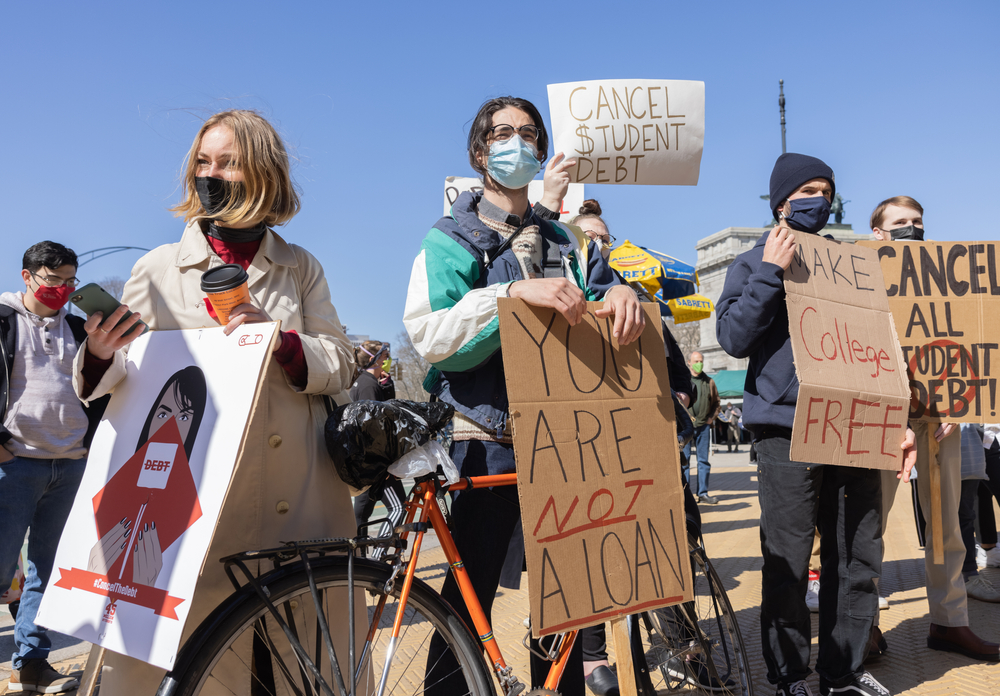
In several rulings last month, the conservative Supreme Court sent a clear message to young adults: Politics matter over people. But young adults are not accepting this.
In one of the rulings, the Court struck down President Biden’s widely popular student debt relief plan that would have relieved between $10,000 and $20,000 of student loan debt for over 40 million borrowers. The public decided on this plan long before the Court, with 70 percent of Americans supporting student debt cancellation. Yet, the Court was swayed by choosing ideology over people, and young adults are again witnessing the deliberate attacks on democracy and human rights — and we are ready to fight back.
Young adults recognize the unfairness of a society willing to provide government aid to corporations and banks, like through Troubled Assets Relief Program (TARP) legislation in 2007 and 2008 or the PPP Covid relief funds, but not cancel student debt for people who stand to benefit the most. As the decision rings out to every corner of the country, opponents of debt relief need to know this is not the end of the fight. Advocates and young adults are equipping themselves to fight for what is true, necessary, and equitable for this country.
Advocates understand how critical student debt cancellation is for millions of borrowers, especially those from historically marginalized communities, who must borrow loans to finance their education. For example, the average Black student loan borrower takes on nearly 50 percent more debt for a bachelor’s degree than his or her white peers — and Black women hold more than any other group. Among Latinx borrowers, nearly 70 percent have educational debt, and 33 percent of Latinx borrowers have delayed life milestones like getting married or having children due to their student debt. The current higher education financing system leads Black, Brown, and low-income communities into a debt trap, and that is unjust.
Debt in any form is a massive financial burden, but the student debt crisis is unique in that it is not only generational but also a racial and economic justice issue. The current student debt crisis results from many factors, including systemic racism, increased college costs, and decreased government investment in higher education. Young adults are raised hearing a constant refrain that they must obtain a college degree to pursue the American Dream, with over 60 percent of jobs in the economy requiring postsecondary education. This paradox is thrusting young adults with no choice but to go to college to receive a liveable wage in a stratified labor market entrenched in racial capitalism – the accumulation of capital through unequal relations preserved by racism.
When paired with stagnant wages, this creates an economic crisis unique to young adults, but young adults are not the only generation to benefit from student debt cancellation. President Biden’s plan is estimated to help over 40 million borrowers, allowing them to have more monthly income to put toward their savings or other expenses and debts, and several studies cite the positive effects of how a small amount of extra cash can help a person or family with low income.
For some borrowers, though, cancellation of student debt would mean not only extra savings but a pivotal lifestyle change. Take Joey LaCavera, a college graduate from Elmhurst College in Illinois and a Federal Pell Grant recipient. President Biden’s student debt relief plan would have wiped away his debt. With his father’s sudden passing, Joey could use the money left in his pocket to help his mother and brother, who cannot afford their mortgage payment. He is now concerned with his ability to do that after the Supreme Court’s decision and student loan repayments starting soon.
“Biden’s Student Debt Relief Plan was a promising point in my finances since I am helping my mom and brother pay the mortgage on my family home,” said LaCavera. “As a Pell Grant recipient, I would be debt free after the plan. Now I am left wondering how I will continue to help my family and focus on my finances for the future, like purchasing my own home one day.”.
Borrowers like Joey exist all over the country. The good news is that many also know the fight is not over and, more importantly, they are more motivated because they feel the impact of the attacks waged against their well-being. Young Invincibles (YI) and other aligned organizations are fighting for borrowers because we cannot move forward as a country while more than 40 million are being held back by crushing debt. While we continue to protect student debt cancellation, we urge borrowers to reach out to their service providers to find a payment plan that will best fit their needs when payments resume in October.
The Biden-Harris administration also announced its new income-driven repayment plan – Saving on a Valuable Education (SAVE) plan, which will provide borrowers with affordable monthly payments. If you were behind or defaulted on your payments before the pause began, the administration also established Fresh Start. This temporary program automatically benefits borrowers, such as restoring access to federal student aid (loans and grants).
If you are fired up like us and want to join in the fight to protect student debt cancellation, please connect with YI to stay current on advocacy efforts you can join, such as sharing your story, submitting public comments, and showing up on the frontlines.
Satra D. Taylor is the Director of Higher Education and Workforce Policy & Advocacy at Young Invincibles and a third-year doctoral student at the University of Maryland College Park studying higher education.
Alex Lundrigan is the Federal Workforce Development and Finance Policy Coordinator at Young Invincibles.

